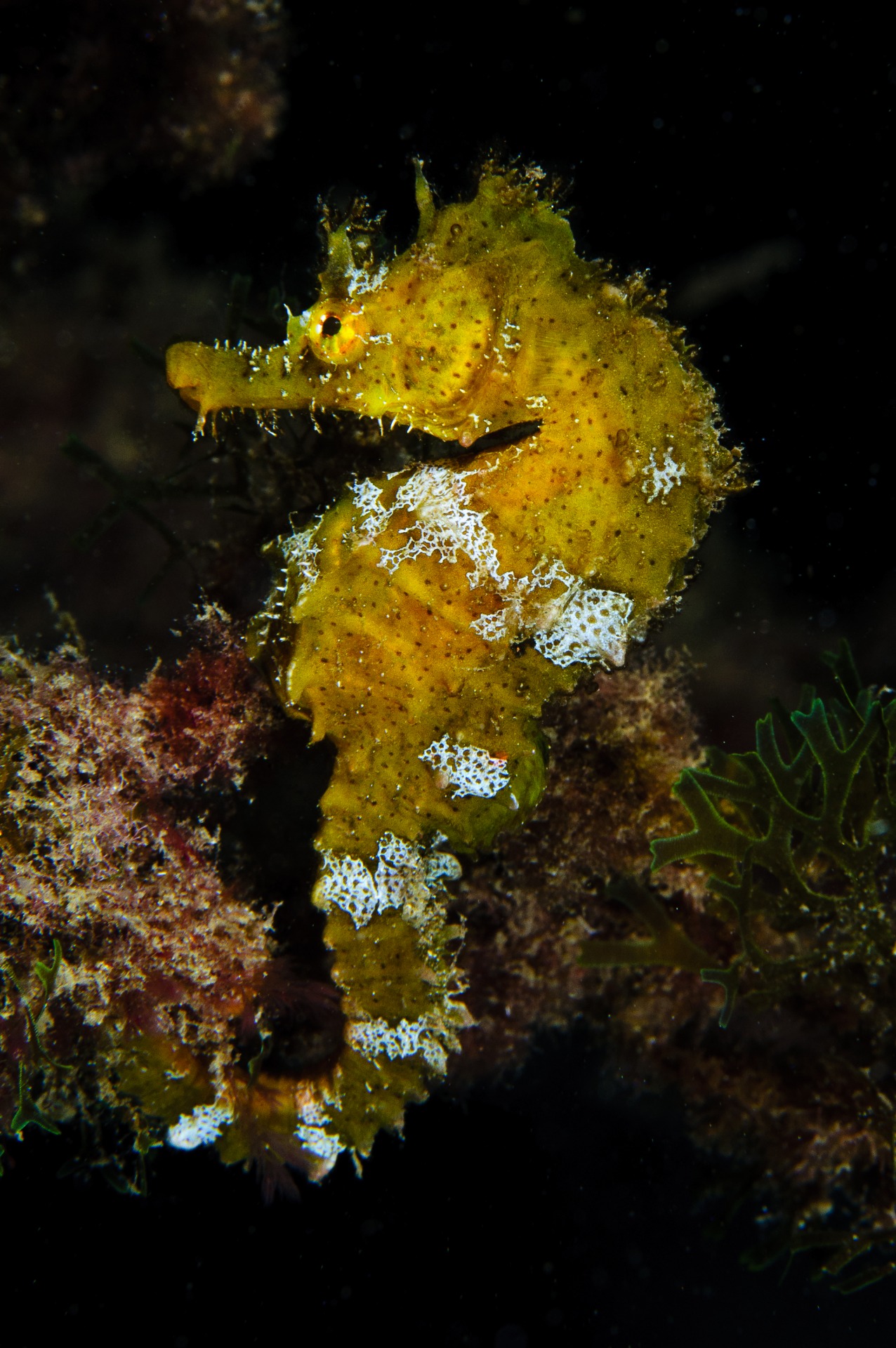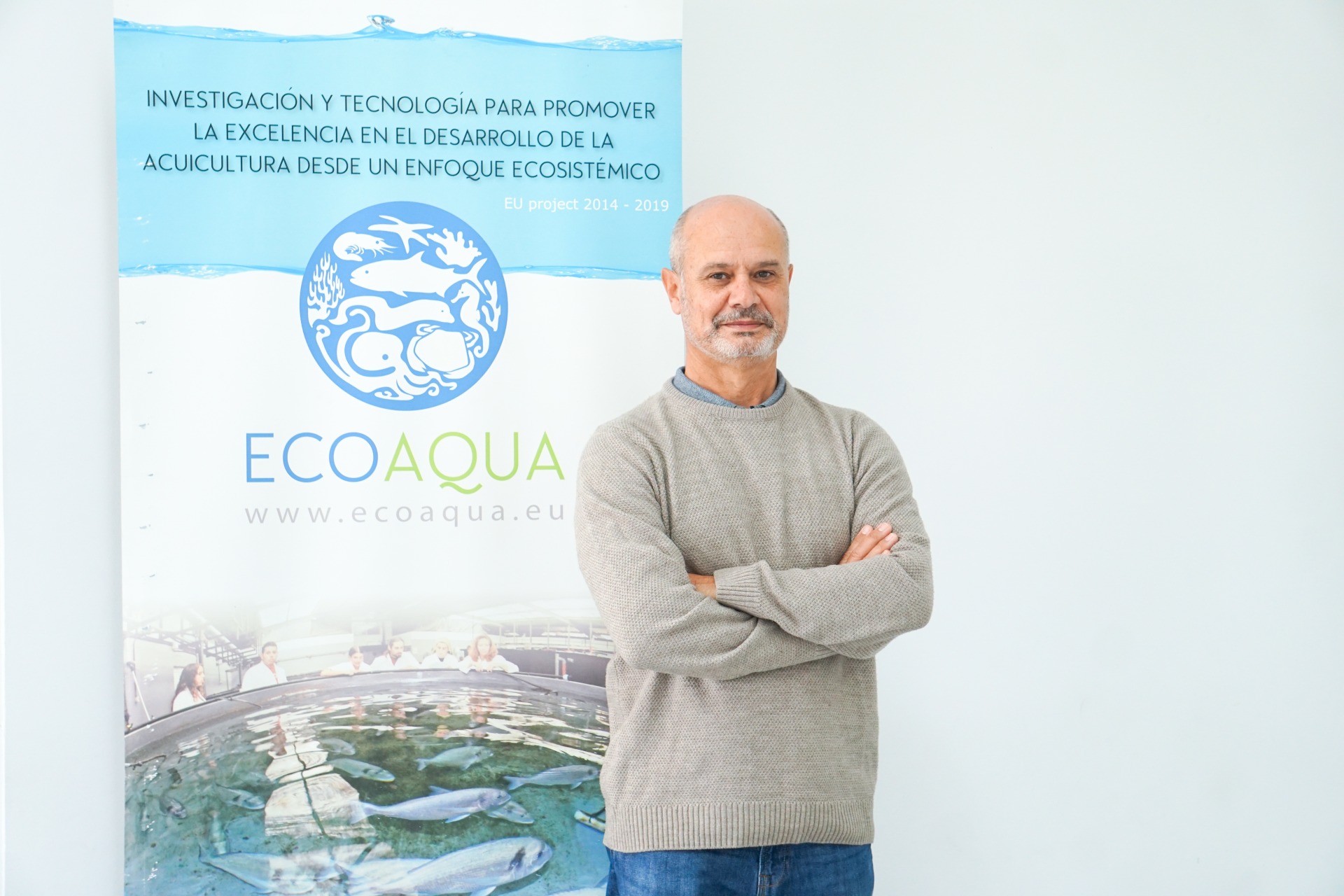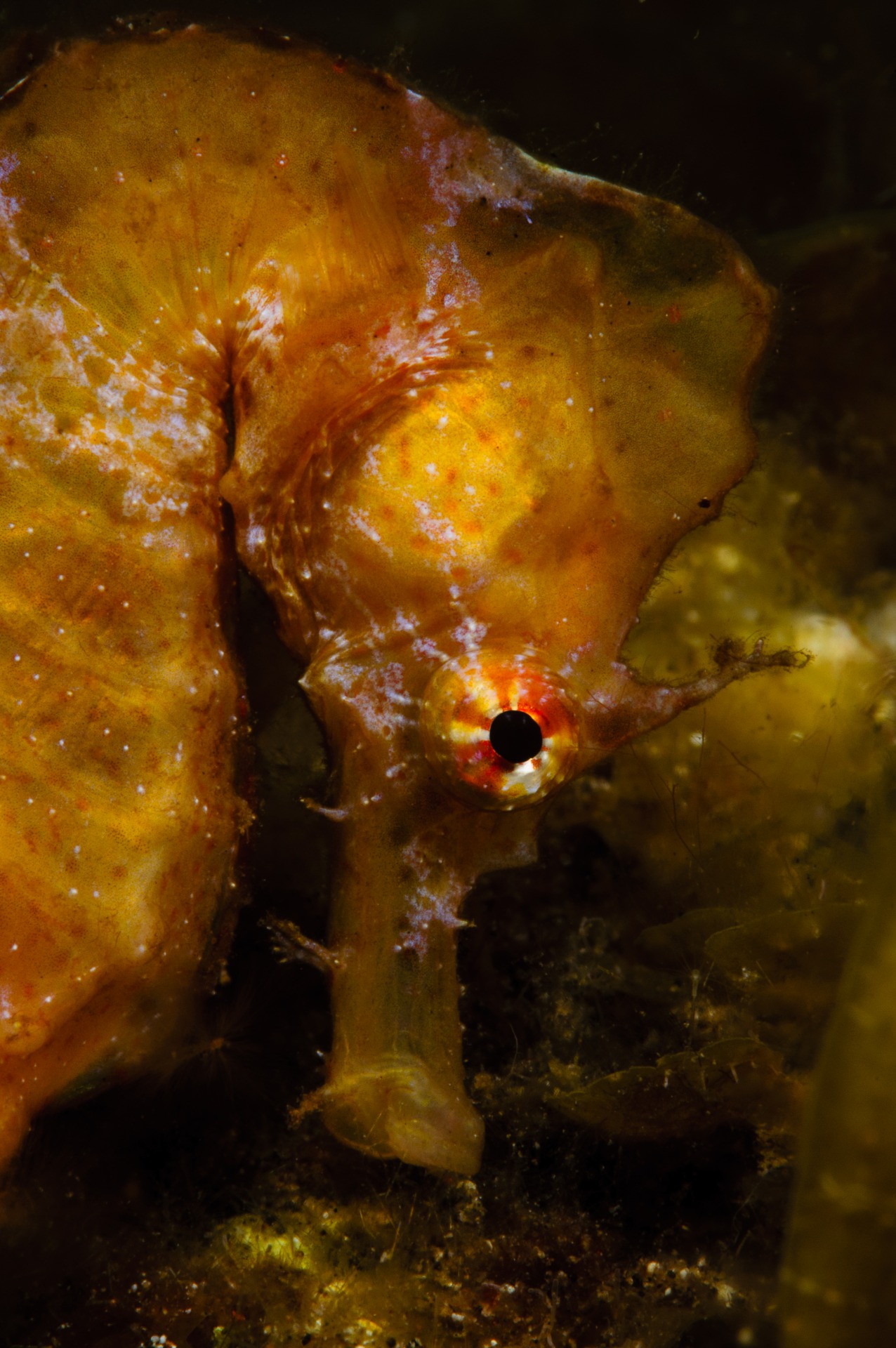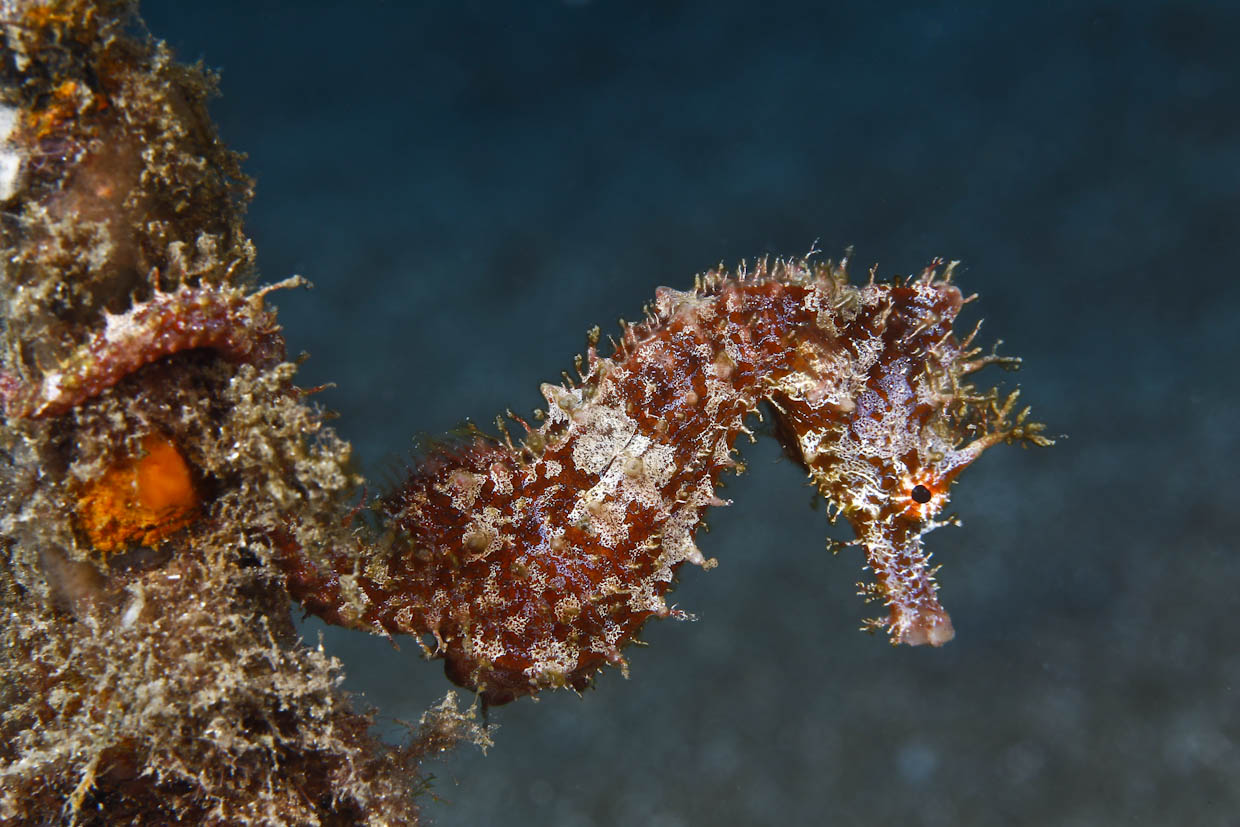With funding from the Biodiversity Foundation, the EUROSYNG project will explore for the next three years with the best specialists in the sector the status throughout Europe of syngnathids, a species that is very vulnerable to climate change and on which there is very little research.
The Biodiversity and Conservation research group (BIOCON) of the University Institute for Research in Sustainable Aquaculture and Marine Ecosystems (ECOAQUA), of the University of Las Palmas de Gran Canaria, participates in the EUROSYNG project, funded by the Biodiversity Foundation and selected in the European call BIODIVERSA+, (the European Biodiversity Partnership under the BiodivProtect research call, and co-funded by the European Commission (GA Nº 101052342)), which aims to study the conservation status of syngnathids (which include seahorses, pipefish and sea dragons) in Europe.
 Image of short-snouted seahorse (Hippocampus hippocampus). Author: Aketza Herrero-Barrencua (please respect authorship).
Image of short-snouted seahorse (Hippocampus hippocampus). Author: Aketza Herrero-Barrencua (please respect authorship).
Syngnathids are a diverse family of teleost fishes that are under great threat from both human activities and climate change. Within European waters there are approximately 18 species of syngnathids. For 55% of them there isn’t enough information on their status and for 83% the current status of their populations, which is to say, an estimate of how many specimens exist, is unknown. These numbers evidence the knowledge breach about these species and about our coastal ecosystems, something that this project aims to in order to detect, reverse or avoid possible future disturbances.
The EUROSYNG project, that will be carried out during 3 years, between 2023 and 2026, counts with the participation of 9 research teams from 7 European countries, which will sample the coasts of ten countries. The total budget of the project is 1,670,042 € for the 7 countries of the consortium (Portugal, Spain, France, Italy, Greece, Germany and Sweden), of which the ULPGC has been the beneficiary with a total of 199,600€.
Canary Islands researchers, among the best European experts on syngnathids
The nine groups of specialists that EUROSYNG gathers have complementary experience, and will count on the collaboration of a wide range of associate entities (NGOs, aquariums, diving clubs, etc.).
The ULPGC team involved in the EUROSYNG project is made up of six experts in marine biology belonging to the BIOCON group of the University Institute ECOAQUA and one expert from the Mathematics Department of the ULPGC. The main investigator leading this group of researchers is José Juan Castro Hernández, an expert in zoology, especially in fish ecology and conservation, and director of the Biology Department of the University of Las Palmas de Gran Canaria.
 José Juan Castro, main researcher of the project, at the facilities of the Faculty of Marine Sciences of the ULPGC. Author: Ángel Medina
José Juan Castro, main researcher of the project, at the facilities of the Faculty of Marine Sciences of the ULPGC. Author: Ángel Medina
Airam Guerra Marrero, a specialist in fish growth and population dynamics, has been designated as EUROSYNG project manager. The team is completed by Francisco Otero Ferrer, Lorena Couce Montero, David Jiménez Alvarado and Ana Espino Ruano, all of them with extensive experience in the study of syngnathids and other groups of marine fish. Angelo Santana del Pino, from the Mathematics Department, will contribute his knowledge in statistics and mathematical modelling applied to biology.
The species studied for Spain are 14. In the Canary Islands up to 9 species have been cited, the most observed by divers being the seahorses Hippocampus algiricus, Hippocampus guttulatus and Hippocampus hippocampus. These fish are characterized for having a peculiar reproduction, in which its the male that incubates the eggs in a ventral pouch until the spawn is born.
The ULPGC will be responsible for assessing the status of syngnathid populations in Spain, for which it will have the collaboration of different entities and groups interested in conservation, such as the Finisterrae aquariums (La Coruña), the Oceanografic of Valencia, the Loro Parque Aquarium (Tenerife) or Poema del Mar (Gran Canaria), in addition to the Government of the Canary Islands, Cabildo de Gran Canaria, Pura Vida Lanzarote Diving, Buceo Norte, Zeus Dive Center, Elder Museum, fishermen’s guilds and associations, among many other entities.
The goal of EUROSYNG is to obtain the necessary information so that the European States can meet the requirements of the International Union for Conservation of Nature (IUCN) resolution WCC-2020-Res-095 by providing a clear portrait of the status of the syngnathid population within Europe.
 Image of short-snouted seahorse (Hippocampus hippocampus). Author: Aketza Herrero-Barrencua (please respect authorship).
Image of short-snouted seahorse (Hippocampus hippocampus). Author: Aketza Herrero-Barrencua (please respect authorship).
To this end, a population genomics study will provide crucial information on the health status, connectivity and migration potential of European syngnathid populations. These data will allow both a critical view of existing marine protected areas as well as help in the creation of new areas that can mitigate the effects of climate change. Moreover, as this is such an attractive species for divers and sea watchers, new tools will be developed to support the blue economy, including nature tourism experiences, and help mediate the inevitable interactions between syngnathids, nature enthusiasts and fishermen.
The proposal aims to provide useful tools not only for this species in the countries sampled (for example, national red lists), but also for the global IUCN and EU red list of threatened species, as it will produce the first detailed image of the health of syngnathid populations.
Research groups associated to EUROSYNG
Associaçao BIOPOLIS (Portugal)
Christian-Albrechts Universität Kiel (Germany)
Hippocampus Marine Institute (Greece)
Uppsala Universitet (Sweden)
Atlantic Naturalist Association (Azores, Portugal)
National Research Council (Italy)
ECOAQUA Institute and Mathematics Department of the University of Las Palmas de Gran Canaria (Spain).
MARE – Marine and Environment Sciences Centre (Portugal)
Muséum National d’Histoire Naturelle (France)
For more information or to arrange an interview, please contact Beatriz Díaz - beatriz@mandarinacomunicacion.es / 620410871


